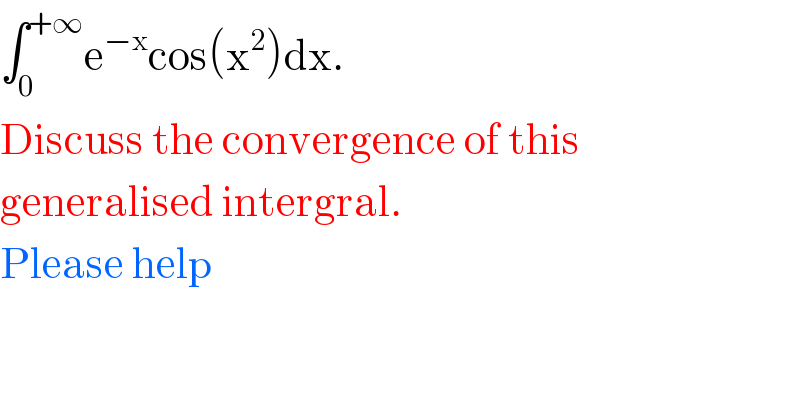Question Number 97563 by 675480065 last updated on 08/Jun/20

$$\int_{\mathrm{0}} ^{+\infty} \mathrm{e}^{−\mathrm{x}} \mathrm{cos}\left(\mathrm{x}^{\mathrm{2}} \right)\mathrm{dx}. \\ $$$$\mathrm{Discuss}\:\mathrm{the}\:\mathrm{convergence}\:\mathrm{of}\:\mathrm{this}\: \\ $$$$\mathrm{generalised}\:\mathrm{intergral}. \\ $$$$\mathrm{Please}\:\mathrm{help} \\ $$
Answered by mathmax by abdo last updated on 08/Jun/20
![I =∫_0 ^∞ e^(−x) cos(x^2 )dx for all a>0 x→e^(−x) cos(x^2 )is continue on [0,a] so integrable on[0,a] at [a,+∞[ lim_(x→+∞) e^(−x) cos(x^2 )dx =0 ⇒ ∫_a ^(+∞) e^(−x) cos(x^2 )dx cv ⇒∫_0 ^∞ e^(−x) cos(x^2 )dx converge. the vslue I =Re( ∫_0 ^∞ e^(−x+ix^2 ) dx) and ∫_0 ^∞ e^(−x+ix^2 ) dx =∫_0 ^∞ e^(((√i)x)^2 −2(√i)x×(1/(2(√i))) +((1/(2(√i))))^2 −((1/(2(√i))))^2 ) dx =∫_0 ^∞ e^(((√i)x−(1/(2(√i))))^2 −(1/(4i))) dx =e^(i/4) ∫_0 ^∞ e^(((√i)x−(1/(2(√i))))^2 ) dx =_((√i)x−(1/(2(√i)))=t) e^(i/4) ∫_(−(1/(2(√i)))) ^(+∞) e^(−t^2 ) (dt/( (√i))) =e^(−((iπ)/4)) e^(i/4) ∫_(−(1/2)e^(−((iπ)/4)) ) ^(+∞) e^(−t^2 ) dt =e^((−(π/4)+(1/4))i) {((√π)/2)−∫_0 ^(−(1/2)e^(−t^2 ) ) dt}...be continued...](https://www.tinkutara.com/question/Q97568.png)
$$\mathrm{I}\:=\int_{\mathrm{0}} ^{\infty} \:\mathrm{e}^{−\mathrm{x}} \:\mathrm{cos}\left(\mathrm{x}^{\mathrm{2}} \right)\mathrm{dx}\:\:\:\mathrm{for}\:\mathrm{all}\:\mathrm{a}>\mathrm{0}\:\:\mathrm{x}\rightarrow\mathrm{e}^{−\mathrm{x}} \:\mathrm{cos}\left(\mathrm{x}^{\mathrm{2}} \right)\mathrm{is}\:\mathrm{continue}\:\mathrm{on}\:\left[\mathrm{0},\mathrm{a}\right]\:\mathrm{so} \\ $$$$\mathrm{integrable}\:\mathrm{on}\left[\mathrm{0},\mathrm{a}\right]\:\:\mathrm{at}\:\left[\mathrm{a},+\infty\left[\:\:\mathrm{lim}_{\mathrm{x}\rightarrow+\infty} \mathrm{e}^{−\mathrm{x}} \:\mathrm{cos}\left(\mathrm{x}^{\mathrm{2}} \right)\mathrm{dx}\:=\mathrm{0}\:\Rightarrow\right.\right. \\ $$$$\int_{\mathrm{a}} ^{+\infty} \:\mathrm{e}^{−\mathrm{x}} \:\mathrm{cos}\left(\mathrm{x}^{\mathrm{2}} \right)\mathrm{dx}\:\mathrm{cv}\:\Rightarrow\int_{\mathrm{0}} ^{\infty} \:\mathrm{e}^{−\mathrm{x}} \:\mathrm{cos}\left(\mathrm{x}^{\mathrm{2}} \right)\mathrm{dx}\:\mathrm{converge}. \\ $$$$\mathrm{the}\:\mathrm{vslue}\:\:\mathrm{I}\:=\mathrm{Re}\left(\:\int_{\mathrm{0}} ^{\infty} \mathrm{e}^{−\mathrm{x}+\mathrm{ix}^{\mathrm{2}} } \mathrm{dx}\right)\:\mathrm{and}\: \\ $$$$\int_{\mathrm{0}} ^{\infty} \:\mathrm{e}^{−\mathrm{x}+\mathrm{ix}^{\mathrm{2}} } \mathrm{dx}\:=\int_{\mathrm{0}} ^{\infty} \:\mathrm{e}^{\left(\sqrt{\mathrm{i}}\mathrm{x}\right)^{\mathrm{2}} −\mathrm{2}\sqrt{\mathrm{i}}\mathrm{x}×\frac{\mathrm{1}}{\mathrm{2}\sqrt{\mathrm{i}}}\:\:+\left(\frac{\mathrm{1}}{\mathrm{2}\sqrt{\mathrm{i}}}\right)^{\mathrm{2}} −\left(\frac{\mathrm{1}}{\mathrm{2}\sqrt{\mathrm{i}}}\right)^{\mathrm{2}} } \mathrm{dx} \\ $$$$=\int_{\mathrm{0}} ^{\infty} \:\:\:\mathrm{e}^{\left(\sqrt{\mathrm{i}}\mathrm{x}−\frac{\mathrm{1}}{\mathrm{2}\sqrt{\mathrm{i}}}\right)^{\mathrm{2}} −\frac{\mathrm{1}}{\mathrm{4i}}} \:\mathrm{dx}\:=\mathrm{e}^{\frac{\mathrm{i}}{\mathrm{4}}} \:\int_{\mathrm{0}} ^{\infty} \:\mathrm{e}^{\left(\sqrt{\mathrm{i}}\mathrm{x}−\frac{\mathrm{1}}{\mathrm{2}\sqrt{\mathrm{i}}}\right)^{\mathrm{2}} } \mathrm{dx}\:=_{\sqrt{\mathrm{i}}\mathrm{x}−\frac{\mathrm{1}}{\mathrm{2}\sqrt{\mathrm{i}}}=\mathrm{t}} \:\:\mathrm{e}^{\frac{\mathrm{i}}{\mathrm{4}}} \:\int_{−\frac{\mathrm{1}}{\mathrm{2}\sqrt{\mathrm{i}}}} ^{+\infty} \:\mathrm{e}^{−\mathrm{t}^{\mathrm{2}} } \frac{\mathrm{dt}}{\:\sqrt{\mathrm{i}}} \\ $$$$=\mathrm{e}^{−\frac{\mathrm{i}\pi}{\mathrm{4}}} \:\mathrm{e}^{\frac{\mathrm{i}}{\mathrm{4}}} \:\int_{−\frac{\mathrm{1}}{\mathrm{2}}\mathrm{e}^{−\frac{\mathrm{i}\pi}{\mathrm{4}}} } ^{+\infty} \:\mathrm{e}^{−\mathrm{t}^{\mathrm{2}} } \mathrm{dt}\:\:=\mathrm{e}^{\left(−\frac{\pi}{\mathrm{4}}+\frac{\mathrm{1}}{\mathrm{4}}\right)\mathrm{i}} \:\left\{\frac{\sqrt{\pi}}{\mathrm{2}}−\int_{\mathrm{0}} ^{−\frac{\mathrm{1}}{\mathrm{2}}\mathrm{e}^{−\mathrm{t}^{\mathrm{2}} } } \mathrm{dt}\right\}…\mathrm{be}\:\mathrm{continued}… \\ $$
Commented by 675480065 last updated on 08/Jun/20

$$\boldsymbol{{thanks}}\:\boldsymbol{{teacher}} \\ $$
Commented by abdomathmax last updated on 08/Jun/20

$$\mathrm{you}\:\mathrm{are}\:\mathrm{welcome}. \\ $$
